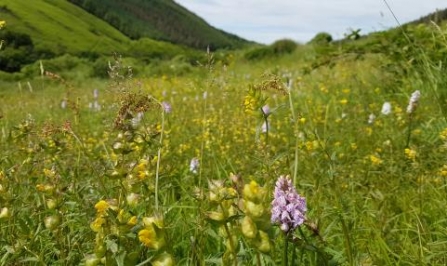
Species Rich Grassland at Glen Dhoo (c) MWT

Species Rich Grassland at Glen Dhoo (c) MWT
The recent IPBES Global Assessment has highlighted the plight of wildlife across the world and how important it is in all our lives. Our wildlife is at risk, and as well as being a cornerstone of our heritage, wildlife on the Isle of Man brings benefits to our health, tourism, and economy. Our peatlands have been valued at £95million and annually we get a value of £42million from our natural world. The Agricultural Strategy is a chance to make sure we support farmers to manage in a nature friendly way, building on our work and helping to make sure wildlife recovers as well as store carbon to reduce the climate crisis.
This issue is so important that for the first time 7 organisations have joined their voice to call for nature friendly farming, which needs more investment by £1.5million a year to help target recovery of our wildlife and much wider benefits to our health, for bees and pollinators, flood storage and climate change mitigation. Any new agri-environment scheme will also need adequate advice, monitoring and support for new ideas to ensure it works. More can be found in the joint statement available on Manx Wildlife Trust’s website.
“We have a real chance to lead and make sure our countryside shows the recovery wildlife desperately needs, all while making sure we tackle the climate crisis and bring huge benefits to everyone on the Isle of Man” Tim Graham, CEO of Manx Wildlife Trust continued “ What’s not to like, and let’s make sure we support farmers and land mangers while saving our unique Manx wildlife”.
Organisations who have signed the statement:
Tim Graham Manx Wildlife Trust
Edmund Southworth Manx National Heritage
Neil Morris Manx Birdlife
Garry Curtis Manx Butterfly Conservation
Nick Pinder Manx Bat Group
Janet Thompson Manx Ornithological Society
Ian Costain Friends of the Earth Isle of Man
The Wildlife and Farming Statement:
The move to include incentives for supply of public goods via public funding is to be welcomed, to reward positive land management for wildlife, climate change and other benefits beyond just agricultural production. There are numerous opportunities presented by this approach, but it is difficult to remain positive without further detail. 88% of land is in agricultural use on the Isle of Man so this is a major opportunity to deliver benefits for wildlife and ecosystems while supporting an adaptive and modern agricultural sector. The strategy lacks clear ambition for the environment but offers a foundation on which the delivery plan can be built.
To improve the return on public investment and value our island ecosystems, we propose the following key aspects be incorporated into future development, especially within any agri-environment scheme that is created:-
- All public investments should be clear, transparent and available for scrutiny.
- Clear Targets and Outcomes for any agricultural environment scheme, with contributions to our national Biodiversity Strategy outlined and conservation status of relevant wildlife (e.g. healthy populations and distributions) measured and communicated. There is also clear opportunity to support Natural Climate Solutions to our climate crisis.
- Schemes should be monitored proportionally and there should be clear resourcing for advice and facilitation.
- The buffer area around the uplands must be considered to enable a joined-up approach beyond a simplistic, hard Above Mountain Line and Below Mountain Line divide.
- Incentives and any agri environment scheme should deliver maximum return on targeted investment so that support is given for the right things in the right place as well as enabling equitable access to be involved (whether through top up greening measures or support for Young Farmers).
- True costs and values should be considered to enable adequate and fair payments to support farmers work, including adequate resourcing for delivery advice/monitoring services and long-term land management options.
- We require adequate consultation and inclusion in the development of the agri-environment scheme.